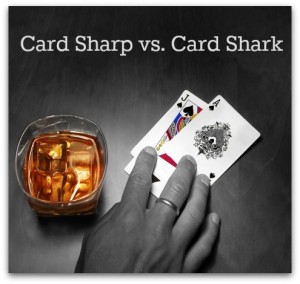In which Uncle John corrects widespread grammatical and language abominations. This one concerns a common slang term that’s been mangled over the years.

While card shark is now considered an acceptable term for a savvy cardsman, it’s only because of the evolution of language, derived from card sharp. Sometimes the language authorities (dictionary makers, and usually the people behind the Oxford English Dictionary) throw their hands up and make an inaccurate usage of a word “officially” acceptable because so many people do it. Examples of this phenomenon: How people use “literally” to describe something figurative, but with dramatic zest (“I was so embarrassed I literally died”) or how things that are just coincidences are deemed “ironic.”
“Card sharp” dates back to the 1880s, the time of Wild West saloons and card rooms, but had evolved into “card shark” by the 1940s, long before Card Sharks could have solidified the change. Oddly enough, both “card shark” and “card sharp” make sense in their usages. “Sharping” is a 19th century slang word that meant “swindling.” It was used in a variety of activities, not just gambling. For instance, a con man posing as a preacher in the Old West might be known as a “gospel sharp.” “Shark” in this regard comes from schurke, a German word that means “a cheater.” A “card sharp,” then, could very well also be a “card shark.”
(Another common English word is derived from schurke: shirk, which means to get out of, or cheat, one’s responsibilities.)








